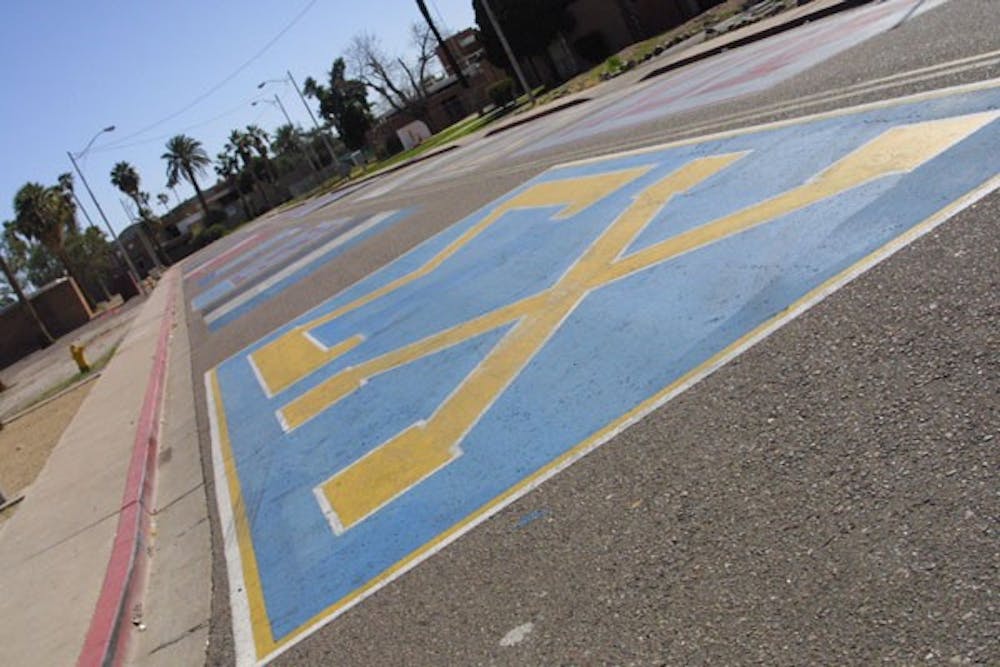The house on 606 Alpha Drive, home to the Sigma Chi fraternity and the location of an alleged 2008 rape, has seen its share of problems.
In May 2003, Sigma Chi began a yearlong probation sentence for hazing violations.
It was the first in a string of University policy violations —from offenses like underage drinking that led to small fines and community service to a recent allegation of sexual assault committed against a former ASU student — that kept the fraternity on nearly-continuous probation for a period of six years.
In a civil suit filed against the ASU Sigma Chi chapter and the national branch by the alleged rape victim’s lawyer in early February, the complaint lists documented problems over the fraternity's history.The suit claims Sigma Chi created an out-of-control and sexually hostile environment that promoted alcohol and drug misconduct as well as improper sexual activity that eventually led to sexual assault.
The suit names former ASU student Matt Potter and current student David Gallagher, both former Sigma Chi members, as assailants in the 2008 incident.
In a Monday e-mail, Gallagher said he “takes this allegation very seriously,” but that he could not comment further because of pending legal matters. The State Press has been unable to make contact with Potter.
Current fraternity member Nicholas Orman said it was unfair for the woman’s attorney to bring the suit against the fraternity as a whole.
"Most of the allegations made in the past were from years ago, when none of the current members were even in college, let alone involved with Sigma Chi," Orman said.
Gallagher is still a student at ASU, but was removed from the fraternity, along with Potter, for owing thousands of dollars, Orman said in an e-mail to The State Press on Feb. 9. Internal affairs at fraternities, like the removal of members, are not public record.
Since then, Sigma Chi in Tempe has gone quiet; a member who answered the fraternity’s door two weeks ago said the fraternity would not comment at this time.
Officials from the Interfraternity Council, Office of Student Rights and Responsibilities and University Student Initiatives have directed all questions to a University spokeswoman.
Documents detailing the history of Sigma Chi’s actions and the University’s response show a pattern of misconduct and ASU policies that were largely ineffective at preventing it.
Sharon Keeler, an ASU spokeswoman, said the University has investigated reports filed against the Sigma Chi fraternity.
However, a distinction should be made between the fraternity as a whole and its individual members when considering these investigations, she said.
"I can tell you that the University investigates any alleged violation of the University's student code of conduct,” Keeler said. “Depending on the severity of the violation and the student's history, the Office of Student Rights and Responsibilities determines the appropriate sanction.”
Michael Dunn, national director of the Sigma Chi fraternity in Illinois, disagreed with the idea that the fraternity’s records show a pattern of misbehavior.
"I've worked with this (Tempe) chapter over the past 10 years and I believe they're a great chapter. We've had no problems with them,” Dunn said.
While individual members are not named in the records obtained by The State Press, per privacy laws, complaints against the fraternity as a whole are named since 2003, nearly all of them involving alcohol. Some of the major infractions include:
· Jan. 22, 2003 — Sigma Chi was charged and found responsible for drug charges, hazing, violation of published rules and offenses prohibited by law. Sanctions included probation, community service and other unspecified requirements.
The chapter was placed on a 45-day probation that started in March of that year, a suspension extended until November after continuing reports of further issues, mainly violations of University alcohol policies.
· Aug. 26, 2003 — An internal e-mail sent to University officials and Greek Relations Board members from Deborah Sullivan, former assistant dean of Student Judicial Affairs and director of Student Life, who has since left ASU, raised concern about violations stemming from parties getting out of hand on Alpha Drive. The Greek Relations Board was responsible for preserving policy and protecting the best interest of ASU fraternities.
"Don't these parties violate the alcohol policy? Is this something the GRB (Greek Review Board) will be looking into? I am confused and I apologize for having to ask this question again, but aren't the frats supposed to not be having these parties unless approved through you all (GRB) and the DPS (Department of Public Safety)? If all of these parties took place and clearly alcohol was flowing, isn't that a policy violation that we or the GRB should act on? If we later were to get a report of a sexual assault, etc. and we took no action on these parties, that could be problematic," Sullivan said in the e-mail.
The documents don’t show any responses to this message.
· May 4, 2004 — A complaint was lodged against Sigma Chi by the mother of a female ASU student after her daughter expressed concern after attending a party in the frat house.
The mother and daughter wished to remain anonymous, fearing retaliation from Sigma Chi, but without filing a formal complaint, Student Life or GRB could not go forward with an investigation, per GRB policy. The mother's concern came after her daughter had told her that while at the party, people were being coerced into sexual acts, nakedness and drinking.
“She also reported that the condition of the house was 'absolutely disgusting,' and that there was urine all over the bathroom and that there were clothes everywhere," said Kacie McKay, an administrative assistant in ASU Student Life and Judicial Affairs in an e-mail. No other documents show a response to this complaint.
· Sept. 24, 2005 — Sigma Chi members, while holding an event in a San Diego hotel, were "inebriated, foul-mouthed and undisciplined throughout the entire weekend.
A man and woman trying to celebrate their 25th anniversary at the hotel had their experience ruined because of the behavior of the fraternity members and their guests," Carla Owen, assistant director of Student Life, wrote in a letter addressed to the Sigma Chi president at the time.
The woman at the hotel wrote to ASU President Michael Crow a month later, outlining what had transpired, largely heavy drinking and partying in a public area after hours. The fallout led to Sigma Chi drafting “Steps toward reconciling the events of September 24, 2005,” an outline of changes drafted by the fraternity after issuing extensive apology letters to the afflicted couple and paying them $700 in compensation for the weekend at the hotel. After investigations and proceedings continued into 2006, Sigma Chi was placed on a one-year disciplinary probation that lasted until Feb. 24, 2007.
· Aug. 19, 2007 — Jay Spradling, assistant chief of the ASU Police Department, notified University officials about a sexual assault reported by an ASU student at the Sigma Chi house.
"The victim, an affiliated student, reported that she was not conscious during the (sexual assault) time period, so there is no suspect information. Investigation continuing," Spradling said in a letter to the University at the time.
After filing a report with the police, the student chose not to file a complaint with the ASU Judicial Affairs office for unknown reasons.
University officials said they cannot comment on specific cases, but e-mails confirm they attempted to reach the student who filed the police report.
The student claims she was drugged and that her brother heard fraternity members bragging that they had “done stuff” to her.
Blood tests were negative for drugs and physical examinations were inconclusive, according to police reports.
The investigation was suspended due to lack of evidence.
Ten days later, Deborah Sullivan, then-assistant dean of Judicial Affairs, contacted Spradling.
"It is my understanding that the alleged sexual assault ... has been reclassified by the police department. I still do not have a copy of the reports. Do you know if the report indicates alcohol, etc. at the chapter house?" she asked Spradling in an e-mail.
No other correspondence between Sullivan and Spradling was documented.
All campus crime reports are required to be released each October by federal law and monitored by the Department of Education, according to the Jeanne Clery Act. The department can impose civil penalties, fees that range into the tens of thousands of dollars for each violation.
According to ASU Police policy and the guidelines of the Clery Act, crimes can be reclassified at the department’s discretion, allowing them to fall into different categories. A sexual assault, for example, could be reclassified as a less severe crime, which can skew statistics.
There were 62 forcible sexual assaults in ASU’s Clery reports between 2002 and 2009, reaching a peak at 10 in 2004 and a low of three in 2008.
Forcible sexual assaults are defined by the Clery Act as any sexual act directed against another person against that person's will or when the victim is incapable of giving consent.
On Feb. 2, 2008, a former ASU student and Pi Beta Phi sorority member was allegedly sexually assaulted by ASU student David Gallagher and former ASU student Matt Potter. Both were members of Sigma Chi at the time.
The woman, who was 19 at the time, alleges that she was drugged by Potter and woke up the following morning in “immense pain.”
The afternoon after the alleged assault, the woman was driven by a friend to Tempe St. Luke's Hospital, where she was evaluated by hospital staff.
An examination concluded that sexual assault and exposure to bodily fluids occurred, according to the woman’s attorney, LaShawn Jenkins.
Hospital staff called ASU police, who interviewed the woman. She said she did not know who assaulted her. An officer gave the woman a field sobriety test and found her blood-alcohol content to be .107.
The police report concluded that officers were unable to confirm whether the sexual activity occurred against the woman’s will. Arizona statute 13-1401 states that if a victim is intoxicated at the time of an assault, whether or not the person consented to sexual activity is irrelevant.
Department policy at the time required the responding officer to request an official rape kit, performed by a forensic nurse examiner, regardless of the victim's request. Police determined there was insufficient evidence for such an examination to be done and the investigation was closed.
Current policy reflects a state law that took effect the next year, allowing victims to request sexual-assault examinations regardless of approval from responding officers.
The sexual assault examination from Tempe St. Luke’s Hospital in the 2008 incident was not considered evidence for prosecution because it did not meet the policy at the time.
Last month, the woman filed a civil action law suit against the two men, Sigma Chi and Sigma Chi's national chapter, citing 13 claims including civil conspiracy, assault, battery, negligence and intentional infliction of emotional distress from the 2008 incident.
Jenkins requested a trial by jury, but as of Tuesday, no dates have been set. Jenkins said he is seeking punitive damages anywhere between $500,000 and $750,000.
On Feb. 12, 2008, the woman met with University officials to discuss the process of filing a complaint with the University. When the University could not guarantee her identity would be protected, she withdrew her complaint and the University did not investigate further.
In December, the woman was interviewed by a prominent nonprofit organization focused on investigative journalism working on a study of sexual assault policies at universities, saying that she chose not to go forward with the complaint because she did not want her name attached to the investigation.
Reach the reporters at kpatton4@asu.edu and derek.quizon@asu.edu





